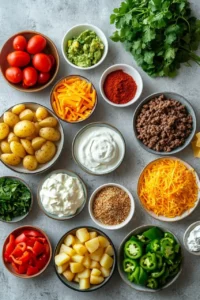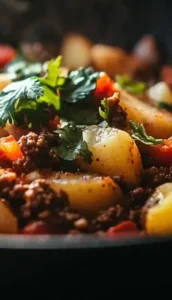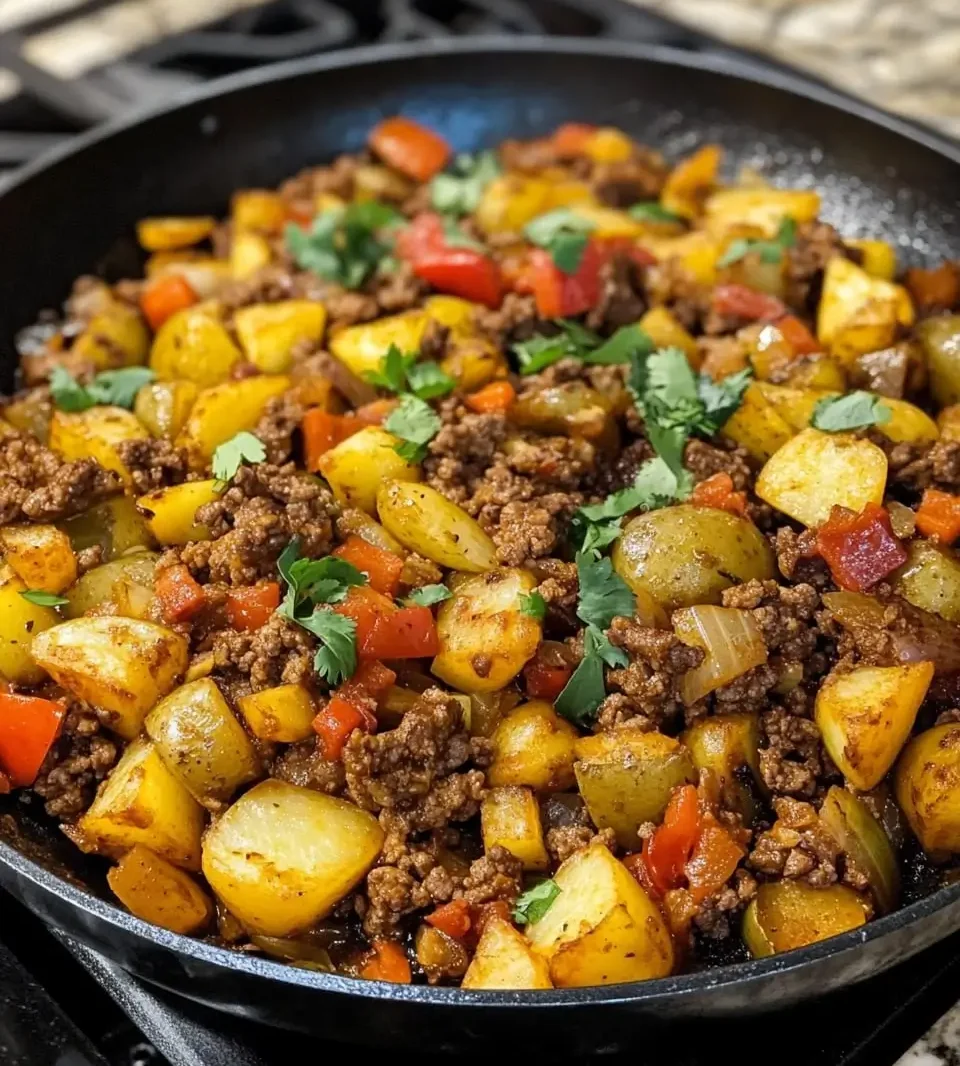soIf you’re searching for a hearty, flavorful dinner that comes together in one pan, this Tex-Mex Beef Skillet is the recipe for you! Packed with bold spices, tender beef, and perfectly cooked potatoes, it’s an easy way to satisfy your cravings without spending hours in the kitchen.ALSO Not only is this dish a crowd-pleaser, but it also checks the box for a quick and nutritious meal for busy weeknights. Let’s dive in and learn how to make this one-skillet wonder step by step.
Ingredients and Preparation
Essential Ingredients for Tex-Mex Beef Skillet
Before we get started, let’s gather all the ingredients you’ll need.
- Ground Beef: Opt for lean ground beef for a rich, hearty base without excessive grease.
- Potatoes: Yukon Gold or red potatoes work best for their creamy texture and ability to hold shape.
- Spices and Seasonings: A mix of chili powder, cumin, smoked paprika, garlic powder, and onion powder gives this dish its signature Tex-Mex kick.
- Vegetables: Bell peppers, onions, and tomatoes add vibrancy and crunch.
- Cheese: Shredded cheddar or Monterey Jack for a gooey topping.
- Optional Garnishes: Fresh cilantro, sliced avocado, or a dollop of sour cream can elevate the final presentation.
Preparation Steps for the Tex-Mex Beef Skillet
Step 1: Prepping the Ingredients
Start by washing and dicing the potatoes into bite-sized pieces. Make sure the pieces are sliced uniformly to ensure they cook evenly. Chop the vegetables finely. It’s a good idea to measure out your spices ahead of time to streamline the cooking process.
Step 2: Cooking the Potatoes
Heat a large, heavy-bottomed skillet over medium heat. Drizzle some olive oil into the pan. Once the oil is heated, toss in the diced potatoes and cook for about 8–10 minutes, stirring occasionally. This will give them a golden brown and slightly crispy texture. After they’re done, remove them from the skillet and set aside.
Step 3: Sautéing the Vegetables
Add a touch more oil to the same skillet if necessary. THEN Toss in the chopped onions and bell peppers, sautéing them for about 3–5 minutes until they’re softened. ALSO Stir in the minced garlic, and allow it to cook for another 30 seconds to release its aromatic flavor.
Step 4: Browning the Ground Beef
Next, add the ground beef to the skillet with the sautéed vegetables.Sprinkle in the chili powder, cumin, smoked paprika, and any other spices of your choice, ensuring the meat is well-coated.
Step 5: Combining and Simmering
Once the beef is browned and no longer pink, return the cooked potatoes to the skillet. Pour in a splash of chicken broth or water to deglaze the pan and create a light sauce. Let the mixture simmer for 5–7 minutes
Step 6: Adding Cheese and Garnishes
Sprinkle shredded cheese over the skillet and cover it to allow it to melt for 2–3 minutes. Once the cheese has melted, garnish with fresh cilantro, slices of avocado, or a dollop of sour cream before serving.

Variations and Creative Twists
Exciting Ways to Customize Your Tex-Mex Beef Skillet
One of the best parts about this Tex-Mex Beef Skillet is its versatility. You can tweak the ingredients or add extras to suit your taste, dietary needs, or simply what’s available in your pantry. Here are some creative variations:
1. Protein Substitutions
- Chicken: Swap the ground beef for shredded rotisserie chicken or ground chicken for a lighter option.
- Turkey: Ground turkey is another lean substitute that pairs beautifully with the Tex-Mex spices.
- Plant-Based: For a vegetarian twist, use crumbled tofu, lentils, or a meatless ground alternative.
2. Potato Alternatives
- Sweet Potatoes: Add a hint of natural sweetness with diced sweet potatoes, which pair wonderfully with the smoky spices.
- Cauliflower: For a low-carb option, replace potatoes with cauliflower florets.
- Rice or Quinoa: Skip the potatoes entirely and serve the mixture over cooked rice or quinoa for a hearty grain-based meal.
3. Spice It Up!
If you’re a heat lover, consider turning up the spice factor:
- Add diced jalapeños during the sauté step.
- Drizzle hot sauce or sprinkle crushed red pepper flakes over the dish before serving.
- Use chipotle powder instead of smoked paprika for a bolder, smoky heat.
4. Cheese Galore
Experiment with cheese choices:
- Pepper Jack for an extra kick.
- Queso fresco for a milder, crumbly texture.
- Vegan cheese shreds for a dairy-free option.
Adding a Mexican-Inspired Touch
- Incorporate black beans or corn to add more texture and a traditional Tex-Mex feel.
- Serve with warm tortillas on the side to turn the skillet into a DIY taco night.
- Top with a drizzle of tangy lime crema for an added burst of flavor.
A Creative Serving Idea
Turn your skillet creation into a Tex-Mex nacho platter by layering the beef and potato mixture over tortilla chips, then topping with cheese, guacamole, and salsa.
Healthy Modifications and Benefits
How to Make Your Tex-Mex Beef Skillet Healthier
Tex-Mex cuisine is known for its bold flavors, but that doesn’t mean it can’t be healthy. With a few simple tweaks, you can turn this Tex-Mex Beef Skillet into a nutritious dish that fits your dietary goals.
1. Choose Lean Proteins
- Opt for 93% lean ground beef to reduce saturated fat without losing flavor.
- Substitute with ground turkey or ground chicken for an even lighter alternative.
2. Add More Vegetables
- Bulk up the dish with nutrient-rich vegetables like zucchini, spinach, or broccoli.
- Toss in a handful of frozen peas or green beans during the simmering step.
- Dice mushrooms finely and mix them with the ground beef for a sneaky veggie boost.
3. Switch to Healthy Fats
- Use olive oil or avocado oil in cooking instead of butter or margarine.
- Skip the sour cream topping and opt for plain Greek yogurt for added protein and probiotics.
4. Reduce Sodium
- Use low-sodium chicken broth or water to deglaze the pan.
- Replace store-bought taco seasoning with your own spice blend to control salt levels.

Nutritional Benefits of Tex-Mex Beef Skillet
1. Balanced Macronutrients
This dish combines protein from the beef, healthy carbs from the potatoes, and fats from the cheese, creating a well-rounded meal.
2. High in Fiber
Adding vegetables and optional beans or corn boosts fiber content, aiding digestion and keeping you full longer.
3. Packed with Vitamins and Minerals
- Bell peppers contribute vitamin C.
- Potatoes provide potassium and complex carbs for sustained energy.
- Fresh garnishes like cilantro and avocado add antioxidants and healthy fats.
Low-Carb and Keto-Friendly Adaptations
- Replace potatoes with cauliflower rice or zucchini noodles.
- Skip the cheese or use dairy-free options for those avoiding lactose.
- Pair with a side salad instead of tortillas to reduce overall carbs.
With these modifications, you can enjoy all the Tex-Mex flavors you love while sticking to a healthy lifestyle.
Serving Ideas and Creative Pairings
How to Serve Your Tex-Mex Beef Skillet Like a Pro
The Tex-Mex Beef Skillet is a versatile dish that can be served in various ways, making it suitable for casual dinners, meal prep, or even entertaining guests. Here are some serving suggestions to make it shine.
1. Serve It as a One-Pan Meal
This skillet is hearty enough to stand alone. Simply garnish with fresh cilantro, diced avocado, or a dollop of Greek yogurt for a complete and satisfying dinner.
2. Pair It with Complementary Sides
Enhance your meal with these sides:
- Mexican Rice: Fluffy, tomato-flavored rice complements the bold spices.
- Corn Salad: A refreshing side of sweet corn, lime, and cotija cheese balances the savory flavors.
- Guacamole and Chips: Perfect for scooping up the beef and potato mixture.
3. Wrap It Up
- Use the skillet mixture as a filling for soft tortillas to make tacos or burritos.
- Create quesadillas by layering the mixture between tortillas with extra cheese.
- Fill lettuce wraps for a low-carb, crunchy alternative.
4. Transform It Into a Bowl
Layer the skillet mixture over a bed of:
- Steamed rice or quinoa for a hearty bowl.
- Shredded lettuce for a taco-inspired salad.
- Mashed cauliflower for a keto-friendly option.
Toppings to Elevate Your Dish
No Tex-Mex meal is complete without toppings. Here are some ideas:
- Fresh pico de gallo or chunky salsa.
- Thinly sliced radishes for crunch.
- A sprinkle of cotija cheese or crumbled feta.
- Lime wedges for an extra zing.
Presentation Tips
- Serve the skillet in a cast-iron pan directly at the table for a rustic, family-style meal.
- Add a pop of color by garnishing with fresh herbs and a drizzle of crema.
- Place small bowls of toppings on the side so everyone can customize their plate.
Nutritional Information and Benefits
Understanding the Nutritional Value of Tex-Mex Beef Skillet
This Tex-Mex Beef Skillet is not just delicious; it’s packed with essential nutrients that make it a wholesome meal. Here’s a breakdown of its nutritional profile and why it’s a great addition to your meal plan.
1. Calorie Count
- A standard serving of Tex-Mex Beef Skillet typically provides 300-400 calories, depending on the portion size and additional toppings.
- Ideal for those looking for a hearty yet calorie-conscious meal.
2. Protein Power
- Ground beef is rich in high-quality protein, essential for muscle repair and overall health.
- One serving can offer 20-25 grams of protein, helping to keep you full longer.
3. Carbohydrate Content
- Potatoes are a good source of complex carbs, offering a steady and reliable energy boost.
- For a low-carb version, swap potatoes with alternatives like cauliflower or zucchini.
4. Healthy Fats
- The addition of avocado and optional olive oil introduces heart-healthy monounsaturated fats.
- Using cheese adds both flavor and essential fats for a balanced macronutrient profile.
Key Vitamins and Minerals
- Vitamin C: Bell peppers and optional lime juice are excellent sources, boosting immunity.
- Potassium: Found in potatoes and avocado, it supports heart and muscle function.
- Iron: The ground beef provides a significant amount of iron, essential for energy production and red blood cell health.
Dietary Benefits
- High Fiber: Adding beans or vegetables increases the fiber content, aiding digestion and promoting satiety.
- Gluten-Free Option: When prepared without tortillas, this skillet is naturally gluten-free.
- Keto-Friendly Potential: By substituting potatoes with cauliflower, this dish becomes low in carbs, making it suitable for ketogenic diets.
Making the Most of These Benefits
when balancing your portion sizes and incorporating nutrient-dense toppings, the Tex-Mex Beef Skillet can fit seamlessly into various dietary preferences while delivering maximum flavor and nutrition.
FAQs
How Long Does It Take to Cook Ground Beef in a Skillet?
Cooking ground beef in a skillet is quick and easy. So On medium-high heat, it typically takes about 7 to 10 minutes to brown ground beef completely. then Make sure to stir frequently to break it into smaller pieces and cook evenly.The beef is done when it turns brown and there’s no pink left. For extra safety, check that the internal temperature reaches 160°F (71°C) using a meat thermometer.
Do You Cook Potatoes or Meat First?
For the Tex-Mex Beef Skillet, it’s best to cook the potatoes first. Why? Potatoes take longer to soften, especially if you want a crispy exterior. firstly Start by sautéing diced potatoes in oil until golden brown and tender. Then, set them aside and cook the ground beef in the same skillet. finally Once the beef is browned, combine it with the cooked potatoes, allowing the flavors to meld perfectly.
Do You Put Oil in the Pan When Cooking Ground Beef?
Using oil when cooking ground beef depends on its fat content,until you’re using lean ground beef (like 90% lean), adding a tablespoon of oil helps prevent sticking and ensures even cooking,then For higher-fat ground beef (like 80% lean), you typically don’t need oil because the fat from the meat renders as it cooks. however If you’re cooking in a nonstick skillet or cast iron, oil can also enhance the flavor.
Is It Good to Cook Ground Beef in a Cast Iron Skillet?
Absolutely! A cast iron skillet is an excellent choice for cooking ground beef. before Cast iron retains and distributes heat evenly ,creating a nice sear on the meat. the skillet’s natural nonstick surface (when well-seasoned) prevents sticking. Plus, the pan can go straight from stovetop to oven if your recipe calls for it, adding versatility to your cooking.

